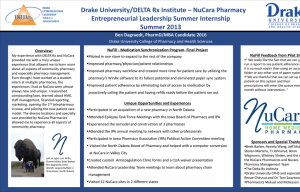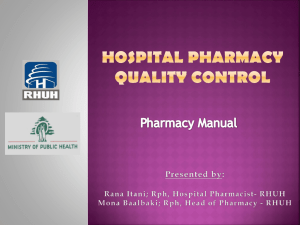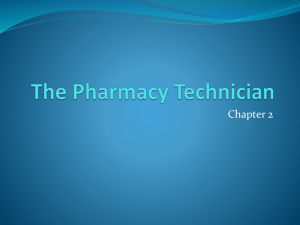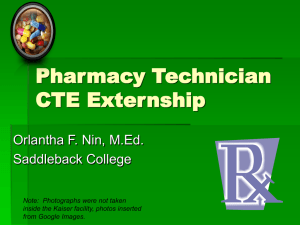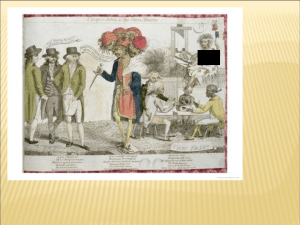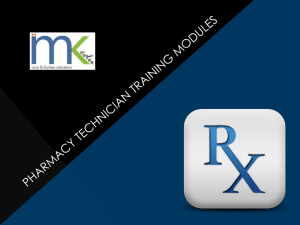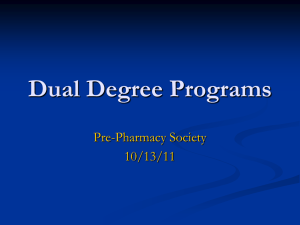Thomas Jefferson University Meeting
advertisement
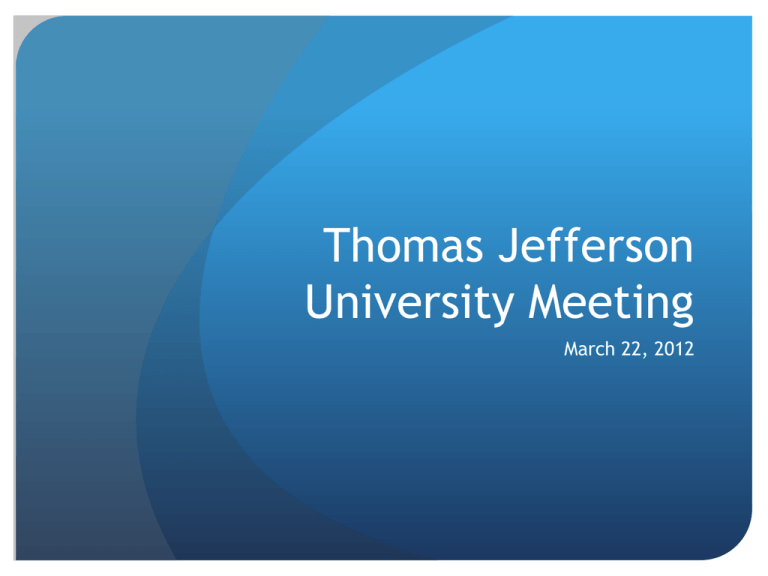
Thomas Jefferson University Meeting March 22, 2012 Pharmacy Interest at UD Talk to your advisor to add pharmacy interest onto your major. Pharmacy interest is not a major. If you do add pharmacy interest, you can always remove it, you are not committed to it. It only indicates that you have an interest in pharmacy. If you are currently in pharmacy interest and decide you're no longer interested in pharmacy, please notify Professor David Usher so he can remove you from the interest group. You can be any major to go into pharmacy. Most frequent majors are biology or chemistry. Biological Sciences with a Concentration in Pharmacy This program is 3 years at UD and 4 years at Thomas Jefferson If you are admitted to Thomas Jefferson, your major gets changed to Biological Sciences (BS) with a Concentration in Pharmacy. This is a special program between UD and Thomas Jefferson, it does not happen with any other school. Being admitted to UD does not mean you are admitted into Thomas Jefferson. Once you are admitted to Thomas Jefferson Bring your acceptance letter to Ramona Wilson and she will change your major from Biological Sciences with a Pharmacy Interest to Biological Sciences with a Concentration in Pharmacy. After 4 years at Thomas Jefferson, if all goes well you will receive your Doctor of Pharmacy (PharmD). Your first year at Thomas Jefferson will fulfill your last year at UD. After your first year at Thomas Jefferson you get your BS with a Concentration in Pharmacy from UD. Again this does not happen with any other schools, only between UD and Thomas Jefferson Thomas Jefferson University (TJU) Pharmacy Education in the U.S Doctor of Pharmacy (PharmD)- required for licensure as a pharmacist. PharmD requires a minimum of 6 academic years of a student. 2 years pre-pharmacy + 4 years pharmacy school Total of 6 years of pharmacy education Accreditation Council on Pharmacy Education (www.acpe-accredit.org) Pharmacy Education in the U.S Currently 125 schools of pharmacy in the U.S. with accreditation status 102 full accreditations 17 with a Candidate Status (TJU) 8 with Pre-Candidate Status Other info for students- www.aacp.org www.pharmacist.com Thomas Jefferson Schools of Health Care Jefferson School of Pharmacy Jefferson Medical College Jefferson College of Graduate Studies Jefferson School of Nursing Jefferson School of Health Professions Jefferson School of Population Health There is great integration between these professions, students at Thomas Jefferson often interact with each other. Why Thomas Jefferson University? Leading health science university and healthcare system Opportunities for interdisciplinary education and training. One of the most outstanding hospital pharmacy programs in the country. Faculty that bring expertise from many schools of pharmacy and practice settings. Graduates for all Jefferson programs are highly recruited by health profession employers. First Graduating Class: 75% students matched with residency to many top hospitals. Many other students accepted into graduate school and research fellowship. About Thomas Jefferson University School of Pharmacy Class size is about 75 First class entered Fall 2008 Degree- Doctor of Pharmacy (PharmD) 4-year professional program Awarded Candidate status-June 2009 First Graduating Class-May 2012 White coat ceremony- when you are accepted and start school at Thomas Jefferson, there will be a ceremony where you will receive a white coat and take the pharmacy oath. The Thomas Jefferson Student Pharmacy students are great communicators. Taught leadership as well as being a team player. Students are encouraged to have cultural competency, being able to understand the different values and cultures and thoughts of patients and their healthcare. Community service is very important. Maintain professional competence throughout their careers. Drugs are constantly changing and so pharmacists must be life long learners. Curriculums are closely tied to professional life, there will be a lot of active learning. Graduates are very aware of the many pharmacy professions out there. After Pharmacy School Graduates are known for great patient care, taking care of the pharmaceutical means of patients and taking care of the health of community. Many graduates will pursue post-graduate training and research. Post-graduate programs are often one to two years and can help start you in a higher health profession. Overview of Curriculum for PharmD Curriculum has a lot of science, has some social science, some math, some administrative and communicative classes. Introductory Pharmacy Practice Experience (IPPE)- is experiential course work. For example: 3 hours in a pharmacy in the 1st year. In the 4th year, most of the work will be in the pharmacy. 2nd year classes you learn: How to make drugs How drugs work in the body How to use each drug on a certain patients (how to decide the right drug and dose) Pharmacokinetics Involves problems such as figuring out how fast it takes a drug to affect a certain area Overview of Course Work cont. 3rd year has pharmacoeconomics, where you learn how to decide which drug will give results and will be most economical and cost effective. 4th year is mainly experimental course work. You will get to try ambulatory care (clinical pharmacist), community (retail), hospital/health system, and inpatient/acute care. You are given 2 open pharmacy practice experiences where you can choose which kind of pharmacy care you want to work in for class. Formal law course. ATTENTION Only a couple courses are described on these slides, just to give a general idea. You can find the whole curriculum here: http://www.jefferson.edu/jchp/pharmacy/Curriculum.cfm Admissions There are two steps to apply Apply to PharmCAS and submit required materials Complete an online application for admission through PharmCAS at www.pharmcas.org Send PCAT scores to PharmCAS using code 104 Complete the Thomas Jefferson supplemental application Deadline: March 1, 2012 TJU has rolling admissions. Prerequisite Requirements Follow the schedule and prerequisites on the UD website: http://www.bio.udel.edu/bs-degree-biological-sciencesconcentration-pharmaceutical-sciences Or TJU’s website: http://www.jefferson.edu/jchp/pharmacy/AdmissionsReq.cfm All prerequisite classes have to be completed before you start at TJU but not when applying. Science and math have to be taken within 5 years. PharmCAS application may be submitted prior to completion of all prerequisites, however all prerequisites must be completed prior to matriculation. If you plan to take classes at a community college, verify with the admissions office at TJU. Application Criteria Expected GPA of an accepted students: 3.0 Minimum overall cumulative GPA desired: 2.7 Minimum prerequisite science and math GPA considered: no grade less than a C in any of the required basic science and math courses. PCAT scores in the 70th percentile are considered competitive Number of entrants expected: 75 Application Criteria cont. Pharmacy-related experience is not required but recommended. Non-U.S. citizens are eligible to apply Letters of Reference: you must have a minimum of 2 letters, and can have a maximum of 4. You will have to do a face-to-face interview with Thomas Jefferson Admissions. PCAT PCAT is required for the application to Thomas Jefferson School of Pharmacy. Application will not be reviewed until PCAT scores and letters of recommendation are available to the Admissions Office. PCAT is administered in January, June, August and October. You can take the PCAT up to 5 times Oldest PCAT considered: within 2 years You can apply to other pharmacy schools even if you are under Pharmacy Interest. Note however, that with any other pharmacy school you will not be able to achieve your Bachelors if you only go to UD for 3 years. You must do 4 years to get your Bachelors if applying to any other pharmacy school. Make sure to check their requirements because they can be different from TJU’s.

